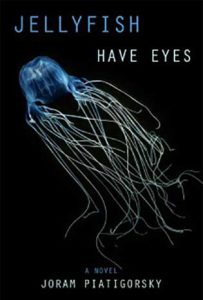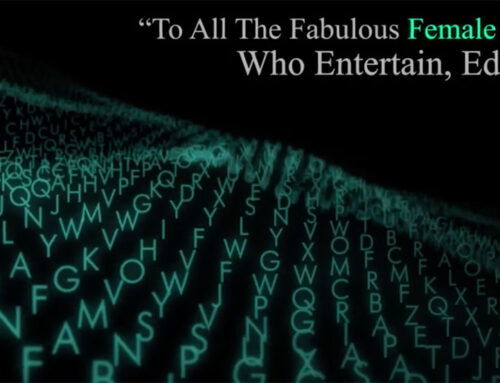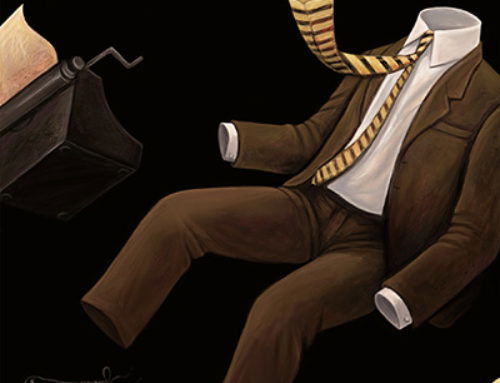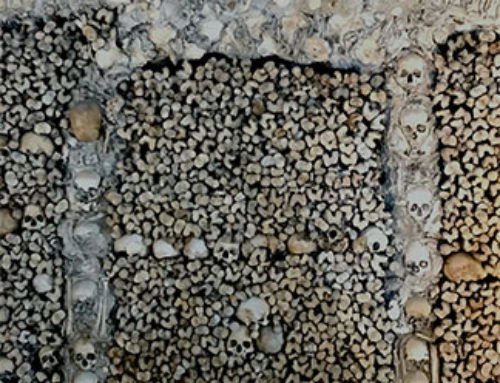
A story usually comes to me as an image – for example, an imaginary man standing in line inspired The Open Door in my short story collection (to be published by Adelaide Books in May, 2019) – or, as a single thought or feeling – such as, a creative anti-hero scientist who blends fact with fantasy in a political climate focused on pragmatism, which led to my novel, Jellyfish Have Eyes. I never know how these initial thoughts will develop into stories, or even if they will remain as first conceived. The stories often retain an element of their origins, but new ideas intercede, and they never end quite as I had thought they would.
In short, the story writes me as much as I write the story.
My uncertainty of any story starts the moment I type the first sentence, which I predictably delete, followed by another sentence, again deleted, and so forth until I bite the bullet and just keep writing. The delete key on my computer is my best friend and savior, and I keep in mind Truman Capote’s advice: “Good writing is rewriting.”
Once I’ve written a certain bulk, I often go back and modify the beginning, sometimes drastically. In writer’s jargon, I try to make the story “work” as it moves along.
Since several years have gone by since I wrote Jellyfish Have Eyes (IPBooks, 2014), I went into the bowels of my computer to retrieve different beginnings over the thirteen years of the novel’s gestation. I was surprised at the many different openings I explored over time. Here I give different opening drafts as the novel evolved. Bear with me and think of this as my journey writing a novel.
May 30, 1999: A Soul-Searching State of Mind
When I started writing, the beginning reflected my soul-searching state of mind with no clear plan on development. I was expressing thoughts, whistling in the wind so to speak, feeling more than thinking, and going overboard for emphasis, enjoying my freedom. I visualized Ricardo, the protagonist, on death row for crimes against Mankind. I hoped to entice the reader to turn pages to find out what these crimes were.
Ricardo Sztein sat quietly in the cramped jail cell without revealing a trace of emotion, remembering his past zest for life that fueled his activities and dreams more than 40 years ago. At the same time, Ricardo’s mind floated freely into the distant future, perhaps a hundred, maybe more years from the present moment while he inhaled/exhaled, inhaled/exhaled reflexively, without effort, taking for granted that this life-sustaining activity would last forever. Ricardo was also rooted in the very moment of his existence, the moment rational people would call now, and if anything, Ricardo considered himself a rational man. It was simply not a rational world.
Ricardo was 86 years old. He had occupied the same cell for almost 5 years, and he knew virtually every crack in the stones surrounding him. At first after the trial he thought that the walls would crush him by their sheer weight of impenetrability, but over time they provided a kind of peace, a small enclave that was entirely his. Meals were slipped through the small opening on the left, and he came to realize that these rock barriers to his freedom were really protections against the constant demands of those who cared more for their momentary needs and personal agendas than for his time or requirements. Imprisonment was not new to Ricardo. Throughout his life Ricardo judged each day by the absence of time and by tasks not completed. These voids were filled with his commitments to future deeds and dreams he assumed would be realized, maybe tomorrow, maybe later, someday. Perhaps this is what made his physical imprisonment surprisingly restful. He no longer had tasks to do, obligations to meet, ladders to climb or people to convince. Peace. All future judgments were no longer his responsibility. He left it to the future he would never see to clear his name. This too he found comforting, since there is always a future, giving an eternity to re-instate him. He was convinced that the infinite makes everything possible, and probably inevitable.
Dr. Sztein had been accused of crimes against Mankind, judged and sentenced to death. He understood perfectly the charges against him; indeed, he could articulate them more eloquently than the lawyers for the prosecution, or was it for the persecution? It did not matter. The simple truth was that Ricardo was found guilty and condemned to death. Ricardo was less frightened about his imminent demise, which he now accepted, than he was astounded that this situation could have arisen at all. It had all started so innocuously that apart from the normal complaints from busy, frustrated people, no one envisioned the insidious consequences that evolved.
February 11, 2006: Love’s Labor Lost
After a few years, I changed the beginning by adding a flashback based on a letter written by Ricardo that he never sent and was found after his death in his prison cell. This would serve to introduce upfront Ricardo’s wife and jellyfish, both central to the novel.
Dear Lillian,
How I wish you were here. You don’t know of anything that has happened to me for the last twenty years, may you rest in peace. I am old now, bent, tired, discouraged. I have given up, Lillian. Do you remember when I was young, when we were both young, the dreams we had, the enthusiasm? You were never as optimistic as I was, but that’s only because you had the good sense to understand that there is no real victory anyhow, that no one really cares about what happens to one. If I had had your cynicism I probably would not be rotting in this prison now.
You ask what happened? Everything and nothing. Remember how I loved to go with Benjamin to study jellyfish in Puerto Rico? It was always such a wonderful break from the drudgery of being a government employee. As you know, it drove me crazy to spend so much valuable time writing memos and justifying the absurdly obvious to people who really didn’t care about much more than making sure the endless list of rules was obeyed. Can you imagine, they even wanted to administer creativity! They also never trusted me. The government was always asking me to prove my innocence even though I never did anything wrong that I know of. Things changed after you died, Lillian, you wouldn’t believe it.
Remember how I used to say that my work with jellyfish is the real me? Well, if that was true, then I killed myself. I committed suicide by being me, although it’s true that I am not dead yet…
I wish you could have been with me the night that I entered the mind of a jellyfish for a few brief minutes. I experienced what no person ever experienced before. Jellyfish live in such a mysterious world. I am convinced that they think and feel and communicate with each other. They have no need for us. It’s only we that can learn from them. They are superior creatures. It has been a privilege to be able to study them, even a little bit, even if I have to die for it.
The trial was an ugly affair. I never could have imagined…well, it’s too painful to talk about. At first, I did not believe that I was in serious trouble, but in retrospect I see that from the beginning of the trial I had no chance. They were going to do away with me; I was their prey…
I’m so confused, Lillian. I can’t figure out how I hurt anyone. Did I really murder people? Who? Do scientists always have to be dispassionate and practical to pay their way? Is science really different from art? How? I have so many questions, the kind that you always tolerated when I brought them up, but never took too seriously. You should have taken them seriously, Lillian, very seriously indeed. It turns out that how people think about things can be even more important than what they actually do
January 4, 2008: Guilty! Wait! What?
Four years later I experimented with starting immediately with the apex of the arc – the guilty verdict for crimes against Mankind – while retaining Ricardo’s sad thoughts in prison as an old man. The beginning now added Ricardo’s feeling of grandeur mixed with feelings of resignation for an incomplete life, failure and hoping for redemption, deepening the complexity of Ricardo’s character.
The clerk handed the judge the white slip of paper with the jury’s decision. After a tense moment the judge instructed, “Please rise for the verdict.” The spectators in the filled courtroom, the jury, the accused, Dr. Ricardo Sztein, and all the others rose as a single beast. A great hush followed the rustle of feet. Ricardo gazed at the judge in his somber black robe and steadied himself by placing his left hand on the rim of the table in front of him. Benjamin stood in the first row behind Ricardo.
“By a unanimous vote, the jury finds Dr. Ricardo Sztein guilty of crimes against Mankind,” said the judge.
Nine years later, 90-year-old Ricardo, thin, stooped, considerably shorter than his 6-foot, 2-inch frame of youth, sat in his cramped jail cell without emotion. His death sentence had not been carried out yet. He knew every crack in the stone wall surrounding him. At first, he thought the walls would crush him by their weight of impenetrability, but over time they softened creating a peaceful enclave. In a way, imprisonment had not been new to Ricardo. Throughout his life limitation of time and tasks not completed dominated his feelings. Now in his cell he no longer had obligations or ladders to climb or people to convince. Peace. He hoped that the future he would never see might clear his name.
In more vain moments Ricardo compared himself to Galileo who was imprisoned for turning his telescope to the heavens. Ricardo had looked down into the murky waters of the seas. It seemed to Ricardo that the difference between the two was in the details. Galileo had reduced celestial bodies to rocky shapes on earth, while Ricardo had shattered the image of human superiority by exploring the lowly jellyfish at a time when people were concerned only about themselves. Ricardo envied Galileo, who had been struck down by the accepted power of the Church. Galileo must have known exactly where he stood from the beginning. His boldness was a monument for admiration.
Ricardo was sucked under by the quicksand of good intentions. Even his martyrdom had been robbed by the Relevancers.
January 10, 2011: When We Were Young
After another three years, I switched gears altogether. Finally (it was about time!) I gave up the inappropriate death sentence. Ricardo’s conviction was only for misuse of government funds, hardly punishable by death. Yet it was hard for me to relinquish the death sentence because I liked the outlandishness of it. The whole story is fantasy, so why shouldn’t it be consistently fantasy? I was weighing reality from imaginings, which is a major theme of the story. So, I started writing about Ricardo’s life starting at his childhood, making the story focus on his character already when he was ten years old, way before the time set of the novel. I guess I got sucked in: I liked him, despite his faults.
The thin boy in worn canvas shoes pressed his pants against his knee with his thumb to stop the blood seeping from his scrape, the result of rushing to school on the slippery sidewalk. The teacher had warned him that she would have to speak to his father if he continued to be late and he didn’t want that. Still out of breath, Ricardo was relieved to be on time as the teacher rambled on about fractions. He paid no attention to her. The blackboard was filled with numbers on top of each other separated by lines. Ricardo didn’t have much interest in numbers, much less in parts of numbers. He liked stories.
Papi will be pissed that I’ve torn my jeans again, he thought. It was the third time that he’d ripped them in the last month. The time before he caught a nail sticking out from a board when exploring a deserted, broken down barn. The sign had said ‘Private Property/No Trespassing’, but he paid no heed; trespassing was exciting and aroused his curiosity. Anyway, who would find out if the place was deserted? Before that incident he’d thrown his jeans on a thorny plant to go for a solitary swim in the stream although his father had told him that he shouldn’t swim alone. What if got a cramp in the water and needed help? The sharp thorns tore the fabric when he grabbed them quickly as some girls strolled by going on a picnic or something. Ricardo, 10-years-old, wasn’t ready to engage with a group of teenage girls, especially not when he was naked. He liked the idea, however; maybe when he was a little bit older. For now, he was content with the fantasy. It turned out he never lost his love of fantasy.
“Ricardo! Which is the bigger number: one-third or one-half? Pay attention. I’m talking to you,” said the teacher.
Snickers of suppressed laughter popped up here and there and he felt blood rush to his face instead of trickle down his leg.
“One-third?”
More snickers, especially from Rosetta, the prettiest girl in the class. She always wore a pink sweater, even when it was hot. She said the color matched her name.
“Why do you think that, Ricardo?” asked the teacher. “Quiet. I want Ricardo to answer,” she commanded the unruly class.
“Uhhh…because three is a bigger number than two?” he answered.
Still more snickers.
“No, Ricardo. Please read your math book when you get home tonight and see me tomorrow after school.”
The rest of the day was no more successful. He gazed out the window and counted clouds. He imagined flying to strange places when he saw a plane cruise by and wished he lived somewhere that he didn’t have to go to school. He wrote stories in his mind about what he thought the kids were thinking, about his father meeting a beautiful woman who would become his mother, about butterflies and ice cream cones. He wasn’t a very attentive student.
Ricardo thought a lot about his cat. Mulligan spent most of his time hiding under a bed or couch, skittish beyond reason. Mulligan also loved adventure. He hunted invisible creatures and retreated from non-existent enemies. When petted. Mulligan purred and then often, without provocation, either slapped Ricardo’s hand menacingly with his paw or twitched his tail, prowled in the vicinity searching for whatever and disappeared on some expedition. Ricardo’s father said that cats could hear better and smell more sensitively than humans, which interested Ricardo but didn’t satisfy him. He remained obsessed with the strange behavior of his mysterious cat well into his teenage years and wanted to know exactly what Mulligan was thinking. He wanted to enter Mulligan’s mind, to know what it’s like to be a cat.
When he started college, Ricardo told Rosetta, who was still a classmate and still wore her pink sweaters, now tighter and more alluring, that he was going to major in cat brains and download Mulligan’s thoughts onto his own. She laughed flirtatiously as if he was trying to be funny, but he was serious. The idea of sensing Mulligan’s imaginary universe haunted Ricardo. He was convinced that it was not just ambient sounds and smells that motivated this cat, but that Mulligan engaged in complex thought processes involving hidden associations of ideas in addition to instinctive responses to stimuli. However, any hopes of learning more about Mulligan’s behavior disappeared when Ricardo was 18 years old; Mulligan chased some air, rolled over with difficulty and called it a life. There was a sad burial in the back yard and Ricardo had lost forever his opportunity to enter Mulligan’s mysterious mental world.
But he never forgot Mulligan. Never.
September 10, 2011: Jellyfish Swim Into View
No, I thought. The timeline is much too great to follow Ricardo from a kid to death in a single novel. The story was about his experiments with jellyfish and its consequences, which touched on what I knew about as a scientist. So, once again, a new beginning, this time with emphasis on Ricardo the scientist. Backstory and character would have to be developed later.
Exhausted yet exhilarated, Ricardo Sztein sat on a rickety wooden stool in the deserted laboratory several hours short of daybreak. A few jellyfish smaller than his fingernail kept him company. How he wished that Lillian had been there with him. He had never imagined himself a widower. He missed her so.
The jellyfish pulsated listlessly around four small glass bowls half-filled with seawater; their short tentacles trailed like thin banners in a breeze. Vertical bands of white testes or orange ovaries underlying the transparent muscular surface bells differentiated the males from the females. Swimming embryos – small orange dots flitting about like mosquitoes – filled the cavity of one female. She would have released her babies into the mangrove of La Parguera if Ricardo hadn’t scooped her up along with the other jellyfish to conduct his experiments. He loved the thrill of collecting the jellyfish in the wild, but he also felt that there was something immoral in yanking innocent victims, even the lowly jellyfish, from their natural habitat. What had they done to deserve such a fate? He looked apologetically at his captives and wondered if they were conscious of their imprisoned state or felt disoriented in the bowls.
Discarded, damp paper towels lay scattered on the floor. Used glass pipettes with tapered ends, a pH meter and a chemical balance with grains of salt spilled carelessly on the weighing tray cluttered the workbench, all trappings of messy science in action. A plastic ballpoint pen lay on an open page of the research notebook with Ricardo’s scribbling and diagrams stained with splotches of dried coffee. A spotlight attached to the dissecting microscope illuminated the Petri dish that had been used to hold the jellyfish that Ricardo punctured with electrodes. The surface of the dish had small puddles of clear seawater. He was happy that jellyfish didn’t bleed.
Wires extending from two electrodes connected an isolated male jellyfish to the computer. An electrode pierced one of the multiple eyes and another pierced the circular band of nerves surrounding the jellyfish midway around the body. Ricardo glanced repeatedly at the computer screen to confirm that the distorted images corresponded to what the jellyfish would see outside the bowl with its tiny impaled eye that dangled in a depression within the bell. It made sense that the jellyfish saw images; after all, the sophisticated jellyfish eyes resembled those of fish and land animals by having a cornea and lens and retina. Why else would such complex eyes evolve if not to see? The jellyfish had four sets of two eyes around its circular body; one eye gazed upward and the other downward in each set. How jellyfish coordinated all the images coming simultaneously from so many directions baffled Ricardo. To know how vision affected jellyfish behavior he needed to be a jellyfish, to enter its mind.
December 1, 2012: Ricardo Sztein Finds His Voice, and a Publisher
By this time, I found the jellyfish experiments too technical, too didactic, too esoteric – a poor beginning. All telling rather than showing. That criticism was confirmed by a prospective agent. It was a scientist’s voice, and this was a novel. I worked some more, until I settled on the beginning below that was ultimately published. Here the timeline was more realistic, and I had the freedom to develop Ricardo’s story. Of course, by now, I had the story completed. Thus, this was a beginning in retrospect, contrived, made to “work” in the context of the whole.
Ricardo Sztein’s life changed forever on January 15, 2047 – a gray, icy Tuesday morning – when Lillian announced at breakfast that she had felt a lump in her breast. “When?” he asked, clearly shaken. “This morning,” she said, “in the shower.” Ricardo didn’t need to tell Lillian how frightened those words made him; she didn’t need to elaborate. A lump in her breast was a lump in his. She was 69, he 70. They had hoped to soon retire: he from the Vision Science Center and she from social work. They were resurrecting forgotten plans and exploring new ones. But now there was a lump in her breast, like her mother had when she was 68. Her father was a widower the following year.
Ricardo met Lillian Shields the day after he had emigrated from Buenos Aires some fifty years ago to be a graduate student at George Washington University. He had responded to an advertisement on the bulletin board to share an apartment with three graduate students. Two of the prospective roommates, both men, had interviewed him at the dining room table. They were sipping lukewarm coffee when Lillian, the third roommate, bounded into the apartment with a cheery “Hi!” carrying groceries and perspiring heavily from the heat of Washington DC in July. She was lean and firm, five-foot four with short, curly auburn hair and dazzling blue eyes. Oh, how she glowed and sparkled. Ricardo, pudgy, five foot six, with a receding hairline, couldn’t take his eyes off her.
After almost forty-four years of marriage, Lillian was his foundation and conscience. He took her for granted in the same way that he never doubted that his heart was a part of his body. She was always there for him when he returned home after a long das in the laboratory. She celebrated his successes and empathized with his disappointments, and never complained when he buried himself in the laboratory on weekends. Their lives were a complementary mosaic. When he made a scientific discovery, Lillian had a sense of accomplishment; when she found a promising foster home for an abused child, he felt virtuous. When he squeezed her gently around her waist, she’d say light-heartedly, “You’re my other half.” He’d respond, “You’re my other three-quarters.” She was his myth of an eternal present.
The Author’s Privilege: That’s My Story and I’m Sticking With It. Unless It Doesn’t Work…
I think of the many times I’ve heard that writing needs to be believable, life-like, made to “work.” And so, stories are whittled into shape, revised and restructured until a smooth, believable story emerges from beginning to end. I don’t deny the importance of this: a book is not life itself. It’s a book that contains only what is written. Magical explanations or inconsistent happenings are not tolerated (exception: magical realism). It is the author’s privilege to control, modify, rewrite, and do whatever necessary to make the story “work.”
Every Story Contains More Than One Tale
The beginning of my novel that was published (the last one above) worked in the context of the whole book, which is about what happens to Ricardo in the sunset of his life – a widower at 70 conflicted between an austere society and his idealism. Upon re-reading, however, I’m most drawn to Ricardo as a little boy, daydreaming in class, thinking about stories, worried about his father’s anger when he rips, once again, his jeans, wondering about pretty girls, but not quite ready for that.
There is always more than one version of any topic or story, just as Monet’s haystacks appear different at different times of day in different light. Why not explore diverse alternatives, perhaps another book on Ricardo, the teen-ager this time? Would that novel end similarly? Revisiting earlier versions, keeping track of the creative process, may provide a rich source for continuing to explore various perspectives and outcomes.
Although the path of our own life cannot be rewritten or reorganized like a book, perhaps it can be revisited as a prompt to explore new avenues for our own future.






Leave A Comment